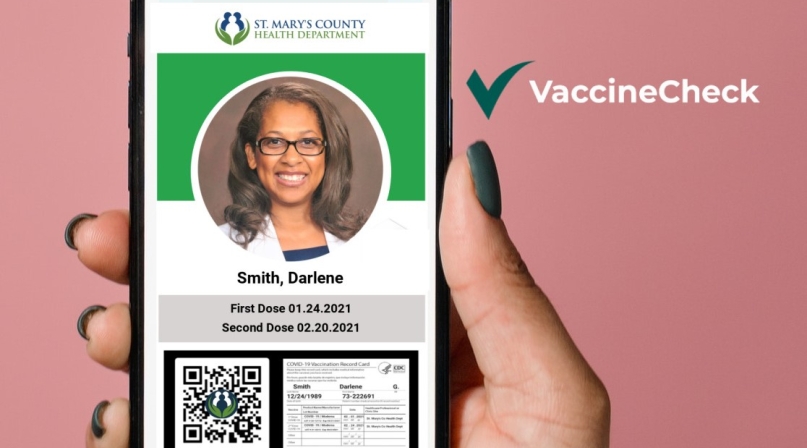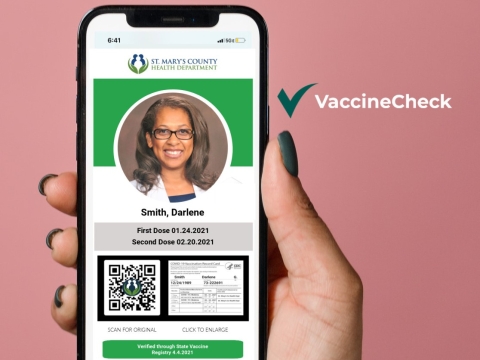Counties equip residents with digital COVID-19 vaccine cards
Author
Upcoming Events
Related News

Counties are finding ways to provide residents with digital COVID-19 vaccine cards as the debate continues as to whether private entities will soon require proof of vaccination or COVID-19 vaccine passports.
White House Press Secretary Jen Psaki said the federal government will not support a system that requires all Americans to carry a credential, adding that there will be no federal mandate requiring a vaccination credential.
In Hawaii, Lt. Gov. Josh Green announced plans for a state vaccine passport pilot program that would allow travelers to bypass state quarantine rules, Hawaii News Now reported. The digital system may be implemented as soon as mid-May.
Erie County, N.Y., County Executive Mark Poloncarz recently announced that fans of the Buffalo Bills football team and Buffalo Sabres hockey team would need to be vaccinated to attend 100 percent capacity games this fall.
Erie County owns the football stadium where the Bills play and the hockey arena where the Sabres play.
Poloncarz said the county has allowed a portion of fans to return to the facilities at no more than 20 percent capacity, as long as they had a negative PCR test within 72 hours of the game.
“The only way we’re going to be able to return 100 percent of the fans to the stands is if everyone is vaccinated,” he said.
Poloncarz said starting with the Bills’ games this fall, all fans and staff who work at the stadium will be required to be vaccinated to enter the facility. He said the county is considering utilizing New York State’s Excelsior Pass, an online application that links to the state health department to confirm vaccine records.
“The only way that we feel comfortable that we can return a full house to the football stadium or the hockey arena is by ensuring individuals in there are protected and the only way to really protect them is to vaccinate them,” he said.
The county is still working out the details, such as how to handle out-of-state fans, but has received support from both teams, which are eager to have 100 percent capacity in the stands.
“If you want to return to normal, get vaccinated,” Poloncarz said. “If you want to go to a Bills or Sabres game this fall, get vaccinated.”
While Orange County, Calif., is not requiring vaccine verification to go onto county property, Supervisor Lisa Bartlett said the county health agency has announced a program that provides residents with digital vaccine records. Originally announced as a digital passport pilot program before changing its name to a digital vaccination records program, Bartlett said county residents can download a digital copy of their vaccine card and testing record through a county-implemented program called Othena. The third-party application is used to register individuals for COVID-19 vaccinations and schedule appointments.
“As more people get vaccinated, they have the opportunity on an individualized basis to download their individual vaccination record,” she said.
Through the app, the county developed an opt-in feature where a user can voluntarily download a digital copy of their vaccine card, according to Bartlett. The application protects medical history and privacy information and is only accessible by the patient.
“It’s not available to any third parties, business entities or other government entities, so nobody else will have access to this information,” she said.
The digital proof of vaccination is meant to help those who may have lost their physical vaccine card and prevent fraud. It has a QR code and can be downloaded on smartphones similar to digital boarding passes.
“It’s voluntary and a lot of people just want to know that they’ve got it with them and they haven’t lost it,” Bartlett said. “If they need to access information, it’s right there on their smartphone so it’s a matter of convenience.”
The Health Department in St. Mary’s County, Md. has also launched a way for residents to obtain digital proof of vaccination.
The department partnered with software company PinPoint to offer free digital COVID-19 vaccine cards for county residents using the VaccineCheck service. The web-based platform creates a digital version of a CDC vaccine card using the Maryland vaccine registry. Through the service, residents can also upload images of their physical card to the system for digital record-keeping.
St. Mary’s County Health Officer Dr. Meena Brewster said with everyone having access to electronic health records, it made sense to allow electronic access to vaccine records.
“This is a convenient way for them to upload an image of their original paper card so that they can always access that original image as well as have an authenticate digital version,” Brewster said.
PinPoint Managing Partner Chris Nickerson said the web-based application is powered by a HIPAA-compliant platform. Residents can access it online through a portal that checks ZIP codes. PinPoint also has the ability to verify records through other state registries, he said.
Brewster said the county partnered with PinPoint in the beginning of the pandemic to launch an occupational health screener for employees and to launch a behavioral health screener to check in on county residents’ mental health.
“We knew there was a demand from our population for being able to access their own personal medical information and we wanted to make sure they could do so when it came to their COVID-19 vaccine record,” Brewster said.

Attachments
Related News

HHS Secretary Kennedy touts fixes for obesity, chronic illness, mental health issues
Counties can help improve health outcomes by prioritizing prevention over treatment, Robert F. Kennedy Jr., secretary of the U.S. Department of Health and Human Services told NACo Legislative Conference attendees.

Drug tracking software helps counties identify trends, save lives
Florida counties are using an artificial intelligence tool called Drug TRAC to track and report drug trends, with the aim of providing quicker outreach and saving lives.

White House Executive Order establishes national substance use disorder response
On January 29, the White House issued an Executive Order (EO) establishing the Great American Recovery Initiative, a new federal effort aimed at coordinating a national response to substance use disorder (SUD).
